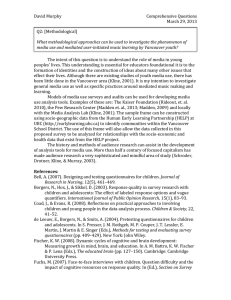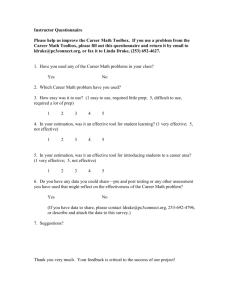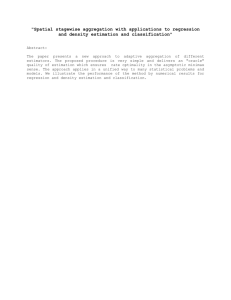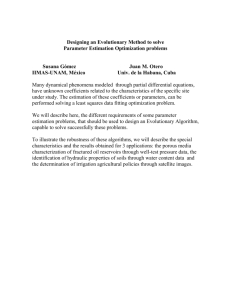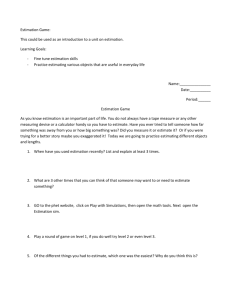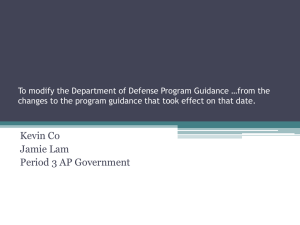Structural Equation Modeling - College of Education
advertisement
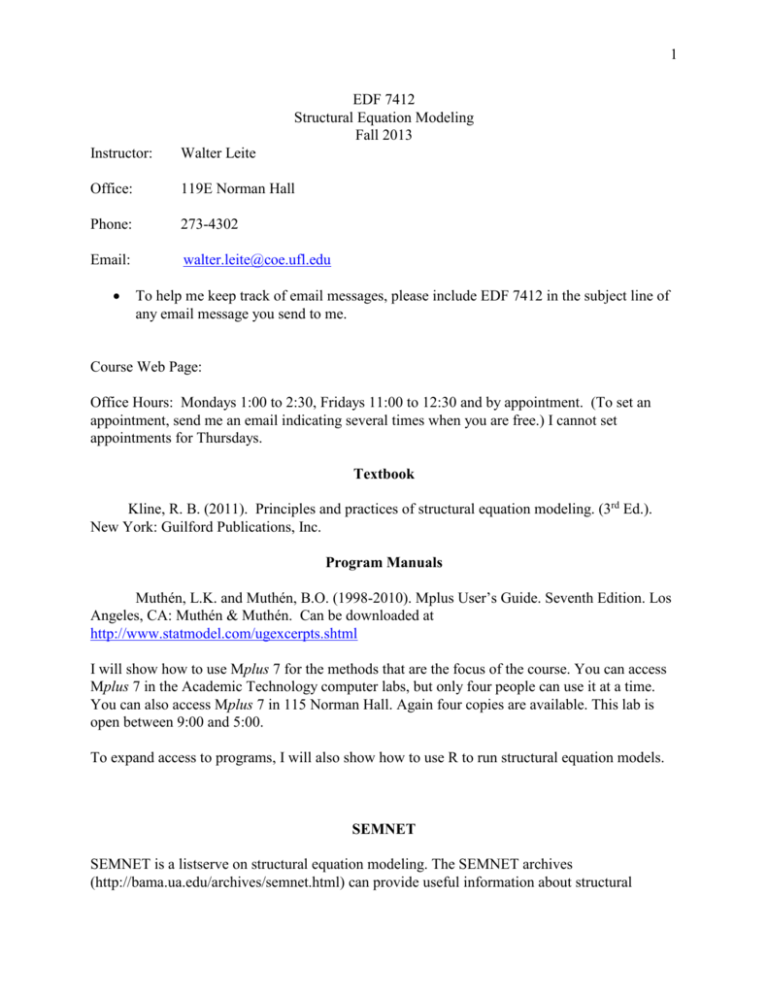
1 EDF 7412 Structural Equation Modeling Fall 2013 Instructor: Walter Leite Office: 119E Norman Hall Phone: 273-4302 Email: walter.leite@coe.ufl.edu To help me keep track of email messages, please include EDF 7412 in the subject line of any email message you send to me. Course Web Page: Office Hours: Mondays 1:00 to 2:30, Fridays 11:00 to 12:30 and by appointment. (To set an appointment, send me an email indicating several times when you are free.) I cannot set appointments for Thursdays. Textbook Kline, R. B. (2011). Principles and practices of structural equation modeling. (3rd Ed.). New York: Guilford Publications, Inc. Program Manuals Muthén, L.K. and Muthén, B.O. (1998-2010). Mplus User’s Guide. Seventh Edition. Los Angeles, CA: Muthén & Muthén. Can be downloaded at http://www.statmodel.com/ugexcerpts.shtml I will show how to use Mplus 7 for the methods that are the focus of the course. You can access Mplus 7 in the Academic Technology computer labs, but only four people can use it at a time. You can also access Mplus 7 in 115 Norman Hall. Again four copies are available. This lab is open between 9:00 and 5:00. To expand access to programs, I will also show how to use R to run structural equation models. SEMNET SEMNET is a listserve on structural equation modeling. The SEMNET archives (http://bama.ua.edu/archives/semnet.html) can provide useful information about structural 2 equation modeling. TOPICS Review of regression and matrix algebra concepts – Chapters 1 to 4 TOPIC A – Model specification, identification, estimation Specification– Kline Chapter 5 1. Steps of SEM 2. Model Diagram Symbols 3. Path Analysis Models 4. CFA Models 5. Structural Equation Models Identification – Kline Chapter 6 1. General Requirements 2. Unique Estimates 3. Identification rules 4. Managing Identification Problems Estimation – Kline Chapter 7 1. 2. Maximum Likelihood Estimation Assumptions Hypothesis Testing and model fit – Kline Chapter 8 1. 2. 3. 4. Model Chi-Square Fit Indexes Information Indices Visual Summaries of Fit TOPIC B – Confirmatory Factor Analysis and Exploratory Factor Analysis Measurement Models and Confirmatory Factor Analysis – Kline Chapter 9 1. 2. 3. 4. Estimation of CFA Models Estimated Factor Scores Equivalent CFA Models Hierarchical CFA Models 3 5. 6. Models for Multitrait-Multimethod Data Measurement Invariance and Multiple-Sample CFA Exploratory Factor Analysis 1. 2. 3. 4. 5. Estimation Rotation Model Fit Interpretation Estimated factor scores TOPIC C – Path Analysis and Structural Equation Models Path Analysis Models 1. Specification 2. Model Fit 3. Interpretation Structural Equation Models – Kline Chapter 10 1. Specification 2. Model Fit 3. Interpretation Mean Structures and Latent Growth Models – Kline Chapter 11 1. 2. 3. 4. 5. 6. Logic of Mean Structures Identification of Mean Structures Estimation of Mean Structures Latent Growth Models Structured Means in Measurement Models MIMIC Models as an Alternative to Multiple-Sample Analysis TOPIC D – Advanced Topics 1. 2. 3. 4. 5. Dichotomous and ordinal variables Missing Data Alternative methods of estimation and robust analysis Latent interactions Multilevel SEM 4 Requirements Summary Assignment Data Analysis—Topic A Exam 1 Data Analysis—Topic B Data Analysis—Topic C Exam 2 Final paper Points 10 20 10 10 20 30 Data analysis problems You will receive three data analysis problems, one for each of the first three topics. The problem for a topic is due one week after a topic is completed. For example, the problem for Topic A will be due one week after Topic A is completed. Note that the order of the problems you receive is not necessarily the same as the order in which the topics are covered in class. Exams There will be an exam after Topic A and after Topic C. the latter exam will cover Topics B and C. The exam covering topic A will take place on the Tuesday in the week after the problem for topic A is due. As a result you will have between 4 and 7 days to prepare for the exam. The exam covering Topics B and C will take place on the Thursday in the week after the problem for topic C is due. As a result you will have between 7 and 10 days to prepare for the exam. For each exam, a list of study questions is available on the course web site. You should keep up with the study questions rather than leaving them for the 4 to 10 days before the exams. Final Paper: The students will submit a final individual paper, which will take the format of a conference submission for the Annual Meeting of the American Educational Research Association (AERA). There are two types of paper: Methodological and applied. Methodological papers should directly address issues involving structural equation modeling, while applied papers should use a type of structural equation model. REM students are required to complete the methodological paper. The methodological paper does not need to contain results, but preliminary results would strengthen the paper (MPLUS can be used to obtain preliminary results). The applied paper should contain at least preliminary results. For the methodological paper, possible goals are to use theoretical analysis and simulations to compare different statistical methods, evaluate the robustness of a statistical method to violations of assumptions, and evaluate the performance of a statistical method in conditions commonly encountered in applied research. For the applied paper, design, conduct, and report an application of one statistical method discussed in class. The applied paper has to be an original analysis of a dataset and cannot be a replication of an analysis previously published or presented at a conference. The paper should follow the style described in the Publication Manual of the American Psychological Association (APA), or a style specific to the student’s field. The students are required to provide a one page plan of their final project several weeks before the final 5 paper is due, for feedback by the instructor and the classmates. Make-up Exams or Other Work: Extra credit - No planned opportunities for extra credit exist in this course. General policy on missed work - It is expected that no students will miss any assignments or inclass tests/exams. No make-ups will be possible unless due to special circumstances (e.g., conference presentations, disease) which will require documentation. Assignments not turned in by their due date will incur grade reduction of 5% per day after the due date. Course Grades Final grades will be assigned based on the scale below: Overall course percent 93.0% - 100% 90.0% - 92.9% 87.0% - 89.9% 83.0% - 86.9% 80.0% - 82.9% 77.0% - 79.9% 73.0% - 76.9% 70.0% - 72.9% 67.0% - 69.9% 63.0% - 66.9% 60.0% - 62.9% 59.9% or less grade A AB+ B BC+ C CD+ D DE Unless a computational error has been made, grades will not be changed after the end of the semester. Class Attendance As a matter of mutual courtesy, please let the instructor know when you’re going to be late, when you’re going to miss class, or if you need to leave early. Please try to do any of these as little as possible. Students are expected to be present for all classes, since much material will be covered only once in class. Attendance will not be checked or graded, but you are responsible for the content of all classes, including issues raised in the spontaneous class discussions. If you must miss a class, please request notes from your classmates. Academic dishonesty For University’s honesty policy regarding cheating and use of copyrighted materials, see: http://www.dso.ufl.edu/judicial/procedures/honestybrochure.php 6 Written assignments will be checked for plagiarism against published works, other papers submitted by classmates at the current and previous semesters and internet pages using Turnitin, which is UF’s plagiarism detection software. It is expected that submitted work for individual assignments will solely reflect the student's own efforts. Students are expected not to collaborate in writing answers, or interpreting results. However, collaborations in running statistical software are acceptable, as long as each student works on his/her report separately. Accommodations for Students with Disabilities: If you require classroom accommodation because of a disability, you must first register with the Dean of Students Office (http://oss.ufl.edu/). The Dean of Students Office will provide documentation to you, which you then give to the instructor when requesting accommodation. The College is committed to providing reasonable accommodations to assist students in their coursework. Counseling and Student Health Students may occasionally have personal issues that arise in the course of pursuing higher education or that may interfere with their academic performance. If you find yourself facing problems affecting your coursework, you are encouraged to talk with an instructor and to seek confidential assistance at the University of Florida Counseling Center, 352-392-1575, or Student Mental Health Services, 352-392-1171. Visit their web sites for more information: http://www.counsel.ufl.edu/ or http://www.health.ufl.edu/shcc/smhs/index.htm#urgent Crisis intervention is always available 24/7 from: Alachua County Crisis Center: (352) 264-6789.
